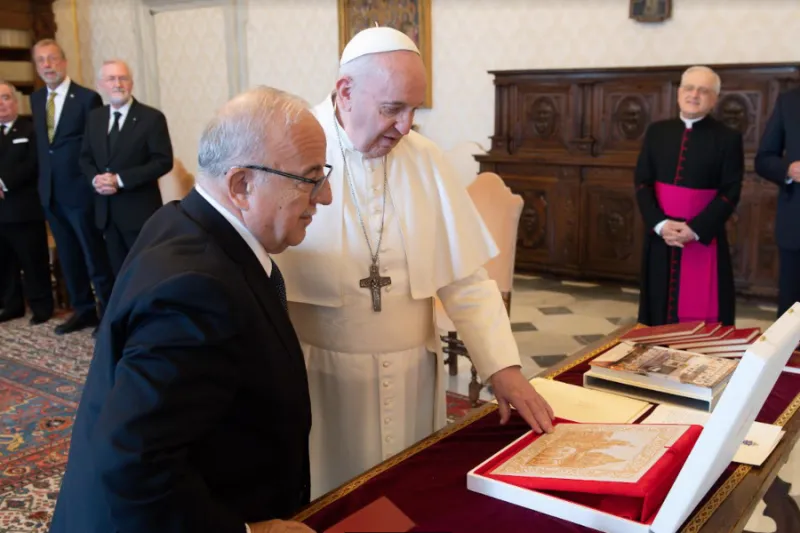
Quito, Ecuador, Sep 12, 2024 / 17:10 pm (CNA).
“The Eucharist and the Transfiguration of the World” was the title of the presentation given by Bishop Andrew Cozzens at the International Eucharistic Congress being held in Quito, Ecuador.
“What is God’s answer to the wounds of the world?” asked the bishop of Crookston, Minnesota, in his remarks.
“His response is to send his Son into our broken world,” Cozzens continued. “The purpose of the Incarnation is for the Eucharist, so that he can offer his life for us, for the healing of our world.”
Cozzens, who also chaired this year’s U.S. National Eucharistic Congress, explained that Jesus Christ redeems the world through his paschal mystery.
“The paschal mystery is the greatest mystery we have because it transforms evil into good,” Cozzens noted.
Reflecting on the power of this work of redemption, Cozzens underscored that “there is nothing so evil, nothing so bad, that it cannot be taken by God and turned into something good.”
The mystery of human suffering
Regarding this aspect of man’s life, Cozzens posed the question: “Why is it that Our Lord did not take away human suffering? Why not? He could have. Why through his death and resurrection did he not end suffering? Well, the reason must be he knew that suffering would be the place where we could learn to express the most love.”
“And so Our Lord did not take away suffering. He entered into suffering, and he transformed suffering from within, and made it possible for suffering to become a force of love in the world. This is the power of redemption, and this is the mystery the Eucharist invites us to every day.”
In that sense, Cozzens pointed out, “the Eucharist wants to teach us how to transform, or we might even say transfigure suffering, so that our sufferings can become a place of glory.”
Addressing the question of why God allows suffering, Cozzens continued: “It could only be so that greater love could come into the world, so that more glory could come. The more we begin to live a Eucharistic life, the more we understand the meaning and the value of our sufferings.”
Cozzens also warned of the temptation, in the face of suffering, to “turn in on oneself.” However, “what the Lord asks is in that moment that I would turn to him and I would see his suffering, and that I would turn to others and see their suffering. And then in my heart, I would make a simple prayer: ‘Lord, I accept this suffering for those people I know who are suffering, for love of you or others.’”
Suffering and the Mass
Cozzens then highlighted that Jesus “invites us to pour out our sufferings to him and ultimately, “he wants to show us how he can use this suffering for good.”
“What happens at the Mass is that I bring my suffering to the altar. And that suffering now is united to Christ’s offering to the Father, and then has the power to pour out love on the whole of the world.”
For this reason, Cozzens emphasized, ”the Eucharist is the heart of the world because through the Mass, all the sufferings of our world are able to be offered to the Father, united with Jesus.”
This story was first published by ACI Prensa, CNA’s Spanish-language news partner. It has been translated and adapted by CNA.
If you value the news and views Catholic World Report provides, please consider donating to support our efforts. Your contribution will help us continue to make CWR available to all readers worldwide for free, without a subscription. Thank you for your generosity!
Click here for more information on donating to CWR. Click here to sign up for our newsletter.





Bishop Cozzen’s theme of transfiguration through suffering might remind us of the 14th-century and mystical Julian of Norwich. About her visions through personal suffering, supplied in her “Revelations,” Bryant Pelphrey gives us such as this:
“Julian’s theology of suffering, as it is experienced by the soul-to-be-saved, always assumes a ‘oneing’ between ourselves and God, in Christ. In this ‘oneing’, his experience becomes our own: in crucifixion, and in transfiguration into glory. This ‘oneing’ finds its greatest expression in the experience of death, out of which we are raised with Christ. Until the time of our transfiguration out of the condition of sin, however, we can do no more than share in the life of love and faith which is Jesus’ life, up to and in the crucifixion. The summary of Julian’s view of suffering, therefore, is to be found in her concept of contemplative prayer, in which we ‘behold’ Christ (who shows himself to us as a crucified Lord, in whose transfiguration we shall eventually share).”
But, also this about life in the world:
“[….] The ‘oneing’ of the soul-to-be-saved with the Son has already taken place; the transfiguration is taking place now, in our own lives, through the Spirit […] this ‘deed’ includes the establishment of the [Eucharistic] Church itself, which is the body of Christ on earth—surrounding us and protecting us with God’s Love” (“The Theology and Mysticism of Julian of Norwich: Love was his Meaning,” Institut fur Anglistik und Amerikanistik, Universitat Salzburg, Austria, 1982).